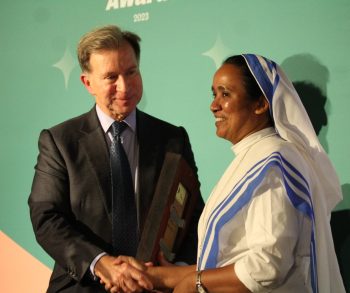By Matters India Reporter
New Delhi, Nov 3, 2023: Friends and associates of Sister Seli Thomas have congratulated her for winning the inaugural Sisters Anti-Trafficking Awards (SATA).
“On behalf of the national Conference of Religious India we congratulate Sister Seli Thomas,” says Apostolic Carmel Sister M Nirmalini, head of India’s more than 130,000 Catholic religious.
Congregation of Jesus Sister Cyntha Anna Mathew, who now works in the United Nations, wrote on her Facebook page: “Congratulations to my friend Seli whose work was recognized and awarded. May you continue to bring hope and joy into the lives of many more women and children.”
Sisters Thomas, a member of Sisters of Mary Immaculate in Krishnagar, West Bengal, received the award at a function in London on October 31 along with Sisters Patricia Ebegbulem from Nigeria and Francoise Jiranonda from Thailand. The three have been rescuing women from networks that profit from sexual and labor trafficking.
Among those paying tribute to the them were former British prime minister Theresa May, and British champion athlete Sir Mo Farah.
The host of the award program said the three “have demonstrated courage, creativity, collaboration, and achievement in the protection of their communities from human trafficking.”
A consortium presenting the awards spoke of the “exceptional contribution of Catholic sisters to the anti-trafficking movement.”
 They pointed out that Catholic sisters are motivated by a “foundational belief in the dignity of every person and service of the Common Good.”
They pointed out that Catholic sisters are motivated by a “foundational belief in the dignity of every person and service of the Common Good.”
“Sisters are often uniquely positioned in remote areas, otherwise out of reach,” SATA press materials said. “They are embedded in and trusted by their communities – key to effective anti-trafficking work.”
Sister Thomas, lawyer nun now based in the eastern Indian city of Kolkata, has helped rescue exploited girls and prosecute traffickers. She focuses on education of youth, providing awareness programs and “a space where they can come and talk to us.” She provides free legal aid and jobs for women, so that their poverty won’t leave them open to exploitation.
Sister Nirmalini, who just returned from Rome after attending the monthlong Synod of Synodality, said she was “truly happy for the mission” Sister Thomas “has undertaken to be a prophet and bring joy and light in the lives of women who are exploited and led astray placing them in dangerous situations to their dignity and life. May she continue to be the voice for these women.”
Sister Mary Scaria, a lawyer in New Delhi, said: “Congratulations to Sr. Seli and best wishes for the bright future ahead.”
A SATA statement noted that while human trafficking is a “networked crime,” Catholic sisters “meet the need for networks [to respond] to an exceptional degree, as part of congregations and the global Catholic community.”
That consortium consists of Arise, an anti-slavery NGO working across the world to protect communities from exploitation; the International Union of Superiors General, a group of female Superiors General that established and supports Talitha Kum, a network of religious sisters against human trafficking; and the Conrad N. Hilton Foundation, established by the international hotelier in 1944.
Sister Jiranonda, a member of the Sisters of St. Paul of Chartres, says education is vital in helping to keep young people from being trafficked. Based in the Thailand capital of Bangkok, she runs the Princess Ubolratana School and the St. Joseph Mae-Chaem School. She also works with the Karen people in remote areas, teaches young women vocational skills for free after high school, and was instrumental in bringing Talitha Kum to Thailand, a major origin and destination for human trafficking in Asia.
Sister Ebegbulem of the Sisters of St. Louis in Lagos has worked against human trafficking for more than two decades. She set up Bakhita Villa, named for the Sudanese slave who became St. Josephine Bakhita. It’s a shelter to rehabilitate and reintegrate survivors of trafficking. She runs mass awareness programs across high-risk rural areas and schools, provides education and employment to help keep young people safer from trafficking, and is a national leader on the issue of trafficking, the SATA statement says.
(With inputs from aleteia.org)










